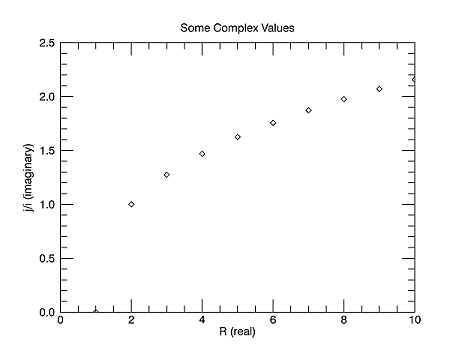The DCINDGEN function creates a complex, double-precision, floating-point array with the specified dimensions. Each element of the array has its real part set to the value of its one-dimensional subscript. The imaginary part is set to zero. For example, C=DCINDGEN(100) will create a 100-element, complex, double-precision, floating-point array with the values {0.0, 0.0}, {1.0, 0.0}, ..., {99.0, 0.0}.
Example

The plot above was created with the following code. Copy and paste this at the IDL command line to run it:
ar = DCINDGEN(10, START=1)
im = FINDGEN(10)^0.35
for i=0,9 do ar[i-1]+=DCOMPLEX(0.0, im[i-1])
myPlot = SCATTERPLOT(REAL_PART(ar), $
IMAGINARY(ar), $
TITLE='Some Complex Values', $
YTITLE='j/i (imaginary)', $
XTITLE='R (real)')
Syntax
Result = DCINDGEN(D1 [, ..., D8] [, INCREMENT=value] [, START=value])
Return Value
Returns an array of the specified dimensions where each element of the array is set to the value of its one-dimensional subscript.
Arguments
Di
Either an array or a series of scalar expressions specifying the dimensions of the result. If a single argument is specified, it can be either a scalar expression or an array of up to eight elements. If multiple arguments are specified, they must all be scalar expressions. Up to eight dimensions can be specified. If the dimension arguments are not integer values, IDL will convert them to integer values before creating the new array.
Keywords
INCREMENT
Set this keyword to a double-precision number giving the spacing between values in the array. The default is 1. Setting this keyword is equivalent to multiplying each array element by this value and then converting to the result type.
START
Set this keyword to a double-precision number giving the value of the first element in the array. The default is 0. Setting this keyword is equivalent to adding a constant offset to each element (after first multiplying by INCREMENT if necessary) and then converting to the result type.
Thread Pool Keywords
This routine is written to make use of IDL’s thread pool, which can increase execution speed on systems with multiple CPUs. The values stored in the !CPU system variable control whether IDL uses the thread pool for a given computation. In addition, you can use the thread pool keywords TPOOL_MAX_ELTS, TPOOL_MIN_ELTS, and TPOOL_NOTHREAD to override the defaults established by !CPU for a single invocation of this routine. See Thread Pool Keywords for details.
Version History
|
Original |
Introduced |
|
8.2.1 |
Added START keyword
|
|
8.3 |
Added INCREMENT keyword
|
See Also
BINDGEN,
CINDGEN,
DCINDGEN,
DINDGEN, FINDGEN,
INDGEN, L64INDGEN,
LINDGEN, SINDGEN,
UINDGEN,
UL64INDGEN,
ULINDGEN,
MAKE_ARRAY